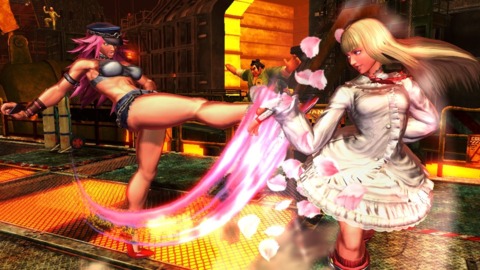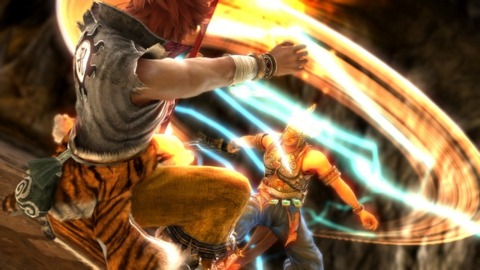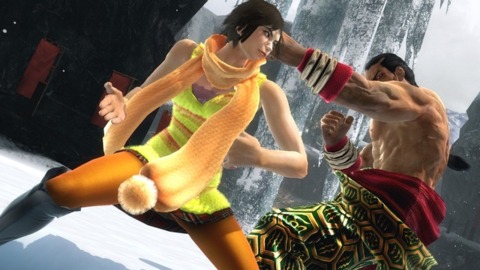Fighting Girls Strike Back
Five female players defend the fighting game community against claims of sexism.
Last month, competitive fighting game player Aris Bakhtanians made the following comment on Capcom's Cross Assault reality show, after being asked to address the use of inappropriate sexual language in the competitive scene:
"This is a community that's 15 or 20 years old, and the sexual harassment is part of a culture. If you remove that from the fighting game community, it's not the fighting game community."
Bakhtanians' comments sparked a fierce response from some members of the fighting game community, who argued that sexist attitudes were largely isolated incidents and that Bakhtanians' comments did not reflect the views of the community at large. The fallout prompted an apology from both Capcom, who created Cross Assault to promote Street Fighter X Tekken, and Bakhtanians, who defended himself by revealing his statements were made in a heated moment and did not communicate his real feelings on the matter.
Despite the public backlash over Bakhtanians' comments, little has been heard publicly from the two female players featured on Cross Assault: Miranda Pakozdi and Sherry Nhan. (GameSpot reached out to both Pakozdi and Nhan for this article but received no reply.) Pakozdi tweeted her disappointment with Bakhtanians following his comments on Cross Assault, but later deleted her posts; Nhan later appeared on a live stream of the LI Joe Show and defended Bakhtanians, saying he was not sexist. (Bakhtanians also appeared on the LI Joe Show to say things had been blown out of proportion.)
In a bid to shed light on the true extent of sexism and sexist attitudes in the competitive fighting game scene, GameSpot contacted five female players from fighting game communities around the world. We asked them to explore the roles of culture, solidarity, and the competitive spirit in shaping the personality of each individual community.
All in the Family
Jessica Jeensalute, aka Jay Jay, is a 26-year-old San Fernando Valley resident who has played Melty Blood, Street Fighter III: 3rd Strike, and Street Fighter IV competitively in tournaments, including North Eastern Championships in Philadelphia, the Evo Championship Series in Las Vegas, and Super VS Battle in London. For her, incidents like the Cross Assault controversy do not correctly portray the unity that exists within the US fighting game community.
"The fighting game community in the US is like a family," Jay Jay says. "A family that argues, picks on each other, loves and hates each other, but in all realness is really full of love for the games. There is a large sense of competitive spirit as well as a drive to beat your fellow gamers. Like any gaming community, there are people that are a bit unruly at times, but those are a few isolated incidents."
Jay Jay knows Bakhtanians personally. She says he's one of the most respectful male players in the US fighting game community, and she has never known him to disrespect or mistreat female players. While she recognises the damage Bakhtanians may have caused in misrepresenting the treatment of female players in the US fighting game community, she says female fighting game players need to know how to stand up for themselves in order to survive in the competitive scene.
"I do not think this incident is an accurate portrayal of the fighting game community, nor do I think the community stands for things like that. But like in any competitive sphere, you should have the ability to stand up for yourself, male or female. If you can't stand up and compete with everything on the line, you shouldn't be there in the first place. At the end of a match, it doesn't matter if you are a child, a man, a woman, or a transvestite. All that matters is if you win or lose. There is nothing holding a female back in the US except their own lack of determination to compete."
"They said I was just a kid and that I should go play with dolls and that fighting games are for adults and men."
Marie-Laure Norindr, aka Kayane, has had 11 years of experience in standing up for herself. The 20-year-old French eLive-sponsored SoulCalibur V and Street Fighter player has been involved in the competitive fighting game scene since she was 9 years old. Learning the ropes from her two Tekken champion older brothers, Kayane has participated in more than 80 tournaments around the world, winning around 15 titles. (Namco recently invited her to London to take part in the SoulCalibur V launch.) Growing up in the scene, Kayane faced criticism for both her age and her gender.
"I quickly became one of the strongest Dead or Alive and SoulCalibur players, and I think most people were surprised about my age at first," Kayane says. "They said I was just a kid and that I should go play with dolls and that fighting games are for adults and men. When I became a young woman, around the time I was 16, people stopped criticising me about my age and began criticising my gender. Because I was in the media a lot during that time, many people said it was because I was a woman rather than the fact that I was good at these games."
Kayane says each fighting game has its own smaller community and that these micro-communities can differ greatly. For example, she says the French SoulCalibur community is more welcoming towards new players than the Street Fighter community is (the former embraced her as a gamer and placed little importance on her age or gender). However, she believes culture has a lot to do with it; for example, how French and European players behave towards each other can be very different to the way US players behave.
"I can't talk for women who live in other countries where there are different persons and mentalities. I know that in the US, it's very different from here. In France, we don't treat female fighting game players badly--we welcome them and respect them. But we do expect them to have the attitude of a real fighter. We expect them to be honourable and motivated to become stronger. If a female player is acting like a princess, waiting for men to teach her everything or to be at her service, then of course she'll have her critics."
Online vs. Real Life
The idea that female fighting game players should be ready to develop a thick skin when entering the competitive scene is echoed by all of GameSpot's interviewees. Samantha Wale, a UK player who has competed internationally in Dead or Alive and Virtua Fighter, migrated to fighting games from the first-person shooter scene, an experience she says that taught her a lot about the importance of pride in the fighting game community. When playing online, Wale could choose whether to reveal her gender or not; in real life, she found some male players felt demoralised by the idea of being beaten by a female.
"You have to have a strong backbone in the gaming world, especially in fighters," Wale says. "I play with males and females and treat both genders the same, and even though I dislike losing, it makes no difference to me whether it is to a female or a male. But I think many male players do not like getting beaten by the opposite sex. I think many of them assume that female players are still learning, and to lose to someone who is learning is not nice if you've been playing hard for many years. It can hurt your pride. But super-competitiveness is just part of the fighting games community: no one likes to lose."
"Meeting players face-to-face makes a huge difference. Most people get some confidence when they are anonymously shit-talking over a microphone, but when it comes to a face-to-face meeting, people are always nice."
Like Wale, New-Zealand born Livia Teernstra started out in the competitive FPS scene before taking up fighting games in 2007, competing in Unreal Tournament and Quake 4 tournaments as well as the 2007 and 2008 Championship Gaming Series (CGS) in Dead or Alive 4. Now living in the Netherlands, Teernstra has spent a lot of time with the European fighting game community, which she says is united by friendship and solidarity--a welcome change to the torrent of abuse she often received online.
"Because of the nature of Xbox games and having to communicate over the microphone, it's pretty difficult to hide your gender. Sometimes people would recognise my XBL tag from CGS, and once people realised I was female, the insults would start. The most popular comments usually had something to do with me going back to the kitchen, or being a slut, and spreading sexual diseases. If it wasn't insults, then it was propositions for sex."
"Meeting players face-to-face makes a huge difference, no matter if it's FPS or fighting games. Most people get some confidence when they are anonymously shit-talking over a microphone, but when it comes to a face-to-face meeting, people are always nice."
Teernstra doesn't believe that discrimination in the fighting game community comes from the competitive or professional level. Usually, she says, it's just "the little kids" who want attention; people at the tournament level see female players as extra competition or, in the case of CGS, a valuable teammate. However, looking back at Bakhtanians' comments on Cross Assault, Teernstra says the US community could have done more to show that his attitude misrepresented the personality of the entire group.
"If just one person had told him to shut up, then maybe it would have demonstrated that his opinions don't reflect those of the community," Teernstra says. "But nobody did, so maybe their silence is agreement? More likely though it's because the topic was so heated that many people just wanted to stay out of it. From my experience, it does seem like there is a big difference between European and US communities when it comes to crossing the line with verbal abuse."
Striving for Equality
Ryan Gutierrez, a fighting game player who co-runs and hosts the US fighting game online entertainment network Cross Counter TV, is adamant that the US fighting game community is just like any other. The problem is not with the community itself, he says; rather, it's that the very high male-to-female ratio can create initial entry barriers for potential female players, who may feel pressured at the idea of having to prove themselves to a community dominated by the opposite sex.
"The percentage of female players in the [US] fighting game community is anywhere between 0 and 3 to 5 percent. It's true that there are more girls around now in this scene than there used to be, but I wouldn't say that they're all competitive players. That number is growing, but it's not growing very quickly."
"There's no welcoming committee… If you want to come in and play, then you come in and play."
Gutierrez guesses that part of the reason female player numbers are growing so slowly has to do with the availability of teaching resources--there aren't that many. Female players who want to play competitively have to find their own way into the community, and once there, they must prepare to undergo serious scrutiny. While attempts to better integrate female players into the community through initiatives like all-female tournaments and meet-ups have been made in the past, Gutierrez believes rolling out a welcoming committee does more harm than good.
"I don't really know that any of that all-girl stuff has worked. I don't think that's what female players want. If I were a girl I'd be offended: I'd say that I don't need some second-class-citizen training session. There's no welcoming committee for anybody else. If you want to come in and play, then you come in and play."
The female players GameSpot interviewed for this article felt strongly about this aspect, in particular the idea that it's wrong to peg fighting game communities as rowdy boys' clubs simply because of their gender imbalance. Zorine Te, aka Harli, a competitive Tekken player from Australia who has competed nationally and internationally in tournaments like the OzHadou Nationals, the Super Battle Opera qualifiers, and the Shadowloo Showdown, says her experience in the community has shown that everybody is given an equal chance to prove themselves, no matter what their gender. She says putting female players on a pedestal for the sole fact that they are female is dangerous.
"There's a bit of a double standard," Harli says. "The very existence of female-only tournaments trashes the idea of equality in the pure fact that male players aren't allowed to enter. Female players don't need special treatment: we need to learn the game the same way everybody else does. The scene is encouraging to everybody, whatever their sexuality or gender."
Harli admits that there's a cultural issue involved: females aren't really brought up in a way that leads to an interest in competitive gaming. However, that shouldn't lead to a misrepresentation of fighting game communities and their attitudes towards female players. From her own experience, Harli says the Australian fighting game community welcomed her with open arms and encouraged her to become a better player.
"In one tournament I got matched up against Australia's top Tekken player of the time, and he picked his best character and absolutely destroyed me. Although he was booed off stage afterwards, I respected that he took me seriously and appreciated the fact that he didn't dumb down his play style for me."
"I don't think a lot of people are aware of the strong sense of unity in fighting game communities. There is this perception that you need to be playing at a high level if you want to be a part of it, but that's simply not true. I count myself lucky to be part of it."
Got a news tip or want to contact us directly? Email news@gamespot.com



Join the conversation